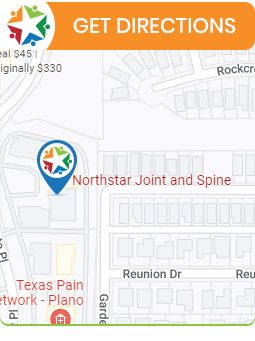Pain Management Specialist, Dr. Robert Nocerini in Plano, TX
If you’re experiencing symptoms such as chronic pain, stiffness, or limited mobility, a pain management specialist can help. Board Certified Dr. Robert J. Nocerini, MD, at Northstar Joint and Spine, offers advanced treatments to address a variety of pain conditions, including back pain, joint pain, and nerve issues. By tailoring treatment plans to meet individual needs, our team focuses on reducing pain and improving movement, helping patients return to their regular activities with greater comfort. Contact us today for more information or book an appointment online. We are conveniently located at 7704 San Jacinto Pl Suite #200 Plano, TX 75024.




Table of Contents:
What are the different types of pain?
When should I refer to a pain specialist?
What conditions qualify for pain management?
What happens at the first pain management appointment?
Expert Care from Board Certified Dr. Robert J. Nocerini, MD, at Northstar Joint and Spine
Pain management specialists are specially trained to treat, diagnose, manage and prevent many different kinds of pain. Another aspect that makes the care provided by pain management specialists so vital is that they seek to address the underlying cause of the pain for long-term relief.
The different types of pain include:
Chronic Pain — When pain lasts for more than six months, it is considered chronic, even after the initial condition has healed. Chronic pain can last for months or years, be persistent or intermittent, and range from mild to severe. Affecting an estimated 50 million adults in the United States, chronic pain is one of the most common conditions in the country. While past illnesses can cause chronic pain, sometimes there is no obvious cause. Without the proper treatment and management, chronic pain can impede one’s ability to perform day-to-day tasks, negatively impacting the quality of life. Because of this, some people living with chronic pain may develop symptoms of a mental disorder, such as depression or anxiety. Symptoms that can accompany chronic pain include tense muscles, lack of energy, and limited mobility. Some common examples of chronic pain include:
• Nerve damage pain
• Low back pain
• Arthritis pain
• Fibromyalgia pain
Neuropathic Pain — Neuropathic pain results from damage to the nerves or dysfunction of the nervous system, which can produce pain that may be described as burning, freezing, numbing, tingling, shooting, stabbing, or sharp. In addition to this, neuropathic pain can cause an increase in skin sensitivity to cold and hot temperatures, as well as sensations such as clothing rubbing on the skin. Diabetes is a common cause of neuropathic pain, but it may have other causes, including:
• Chronic alcohol consumption
• Infections
• Facial nerve problems, such as Bell’s palsy
• Spinal nerve inflammation or compression
• Shingles
• Carpal tunnel syndrome
• HIV
• CNS disorders, including multiple sclerosis or Parkinson’s
• Radiation
• Chemotherapy drugs
Pain specialists are valuable medical professionals that can help patients address their pain and are especially beneficial when other treatments have failed to provide relief. Reasons to see a pain specialist include:
• Pain is not responding to conservative treatment
• Current physician does not know what is causing the pain
• Experiencing chronic pain for no reason
Conditions that qualify for pain management include:
• Arthritis
• Back pain
• Central Pain Syndrome
• Chemotherapy pain
• Elbow pain
• Fibromyalgia
• Foot and ankle pain
• Headaches
• Hip pain
• Knee pain
• Migraines
• Musculoskeletal pain
• Neck pain
• Neuropathy
• Pinched nerves
• Shoulder pain
This list is not comprehensive; many other conditions can qualify for pain management.
The first pain management visit may include an interview or evaluative process, as well as multiple diagnostic tests and a physical examination. To gauge how each of these factors could impact the symptoms described, questions about family history, potential comorbidities, mental health, and former substance use may be asked. Even if a different doctor provided the patient with a diagnosis, a pain management specialist might want to form their own diagnosis, especially if the treatments prescribed by other doctors are not effective. By revealing sensitivities or problems with specific medications, diagnostic tests can provide alternate diagnoses that might better address the root of the problem.
At Northstar Joint and Spine, board-certified pain management specialist Dr. Robert J. Nocerini, MD, delivers compassionate, results-driven care for patients dealing with acute or chronic pain. With extensive expertise in interventional techniques, Dr. Nocerini focuses on identifying the true source of discomfort and creating individualized treatment plans to promote long-term relief. His evidence-based approach emphasizes safety, precision, and patient education, helping individuals understand their condition and treatment options clearly. Dedicated to improving function and quality of life, Dr. Nocerini offers advanced, non-surgical solutions that help patients return to their daily routines with greater comfort and confidence.
If you are experiencing pain that has not responded to other forms of treatment, come to Northstar Joint & Spine today. Our pain management specialist, Board Certified Dr. Robert J. Nocerini, MD can help you address the underlying cause of your pain and improve your quality of life. Contact us today for more information or book an appointment online. We are conveniently located at 7704 San Jacinto Pl Suite #200 Plano, TX 75024. We serve patients from Plano TX, Willow Bend TX, Frisco TX, Allen TX, Addison TX, North Dallas TX, and surrounding areas.

Check Out Our 5 Star Reviews


Additional Services You May Need
▸ Back Pain
▸ Shoulder Pain
▸ Chronic Pain
▸ Epidural Steroid Injections
▸ Spinal Cord Stimulation
▸ Viscosupplementation
▸ Genicular Nerve Blocks
▸ Facet Injections
▸ Joint Injections
▸ Sacroiliac Joint Injections
▸ Lumbar and Cervical
▸ Facet Medial Branch Blocks
▸ Diagnostic Nerve Blocks
▸ Medication Management
▸ Neck Pain Doctor
▸ Diabetic Peripheral Neuropathy
▸ Headaches
▸ Suboxone
▸ Peripheral Nerve Stimulation
▸ Spine
▸ Joints
▸ Muscles
▸ Bones

Additional Services You May Need
▸ Back Pain
▸ Shoulder Pain
▸ Chronic Pain
▸ Epidural Steroid Injections
▸ Spinal Cord Stimulation
▸ Viscosupplementation
▸ Genicular Nerve Blocks
▸ Facet Injections
▸ Joint Injections
▸ Sacroiliac Joint Injections
▸ Lumbar and Cervical
▸ Facet Medial Branch Blocks
▸ Diagnostic Nerve Blocks
▸ Medication Management
▸ Neck Pain Doctor
▸ Diabetic Peripheral Neuropathy
▸ Headaches
▸ Suboxone
▸ Peripheral Nerve Stimulation
▸ Spine
▸ Joints
▸ Muscles
▸ Bones






